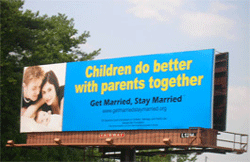 (Image found here.)
(Image found here.)
Ballgame at Feminist Critics writes:
The assertion, “children do better with parents together” could mean a number of different things, so let’s go through the possible ways the statement could be interpreted:
The notion that “Children ALWAYS do better with parents together” is almost certainly false. If one of the parents is abusive, it seems pretty non-controversial to assume that the kids would be better off with the non-abusive parent alone.
The notion that “Children SOMETIMES do better with parents together” is almost certainly true, but so banal and useless an observation that it’s not worth the expense of a billboard or worth discussing at any length.
That leaves “Children GENERALLY do better with parents together.” This, itself, has two entirely different meanings which are easily confused. Take 100 couples with children. Of those couples, 75 are (at the moment) happily married, while 25 have marital difficulties — some severe — and are on the brink of divorce. Let’s say 20 of the 25 couples actually go through with the divorce.
The notion that “Children GENERALLY do better with parents together” could be taken to mean that, out of the 100 families described above, children from the 80 non-divorcing families end up being mentally and emotionally healthier (as a group) than the children from the 20 divorcing families. That is very easy to believe. Indeed, there are any number of studies that show this, and these are the studies that are typically trotted out to misleadingly imply that divorce hurts children. In fact it’s just another rather banal observation that children from happy families do better than children from emotionally fraught ones, and hardly worth the price of a billboard. It’s almost like saying, “People with money are less likely to have difficulties making ends meet.”
But the other meaning of “Children GENERALLY do better with parents together” is quite different: namely, that the children in the 20 divorcing families would have been better off if those parents hadn’t gotten divorced. THAT notion is purely speculative as far as I know.
Via Alas.

Comments 7
NL — January 4, 2009
"Get Married. Stay Married."
OR ELSE.
Jay — January 4, 2009
There's also an assumption underlying that billboard that "together" doesn't count unless you're married. So the woman in my office who was married for 10 months was somehow in a more committed relationship than my unmarried friends who have been together for 15 years. Yeah. Sure.
Alas is a porn front — January 4, 2009
http://sourduck.blogspot.com/2006/10/alas-porn-site.html
http://laurelin.wordpress.com/2006/10/10/alas-a-sell-out/
Alas is a porn front — January 4, 2009
http://laurelin.wordpress.com/2006/10/10/alas-a-sell-out/
SarahMC — January 5, 2009
Because staying together "for the children" never ruined ANYONE'S lives!
And of course, as Jay pointed out, a couple doesn't have to be married to be together. Nor do all married couples have GOOD relationships.
Cycles — January 5, 2009
And, do better at what?
I know what they want me to think, but "do better" is problematic. For example, my partner was raised by his single mother in a house with another single mother and her daughters. The shame! As a result of these deplorable living conditions, he gets along great with women in general, and is one of the most down-to-earth and honest feminists I've ever known.
Also, the assumption that people with children don't think these things through, that the effect on their dependents hadn't ever crossed their minds, that a BILLBOARD, for crying out loud, would suddenly illuminate them to this brand new concept in the history of human relationships - that's insulting.
thewhatifgirl — January 6, 2009
Jay beat me to it. I knew a "couple" - not married and not even dating each other but had had a child together, remained very good friends, and even lived together in order to jointly provide for their child while not being involved with each other sexually or romantically. Their son was a very happy, healthy child the last I heard from them.
Another interesting aspect of this is that I have two friends who recently divorced. According to one of them, in the state of Oklahoma parents who are getting a divorce are required to take a class that basically tells them how terrible they are for getting a divorce and how it will ruin their child's life (her characterization, not mine). Which, considering the two are still best friends but have simply chosen for whatever reason to not be married anymore, seems especially ridiculous - just like this billboard.